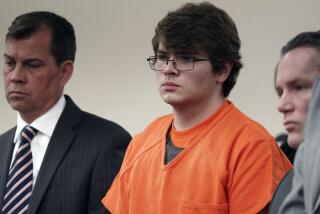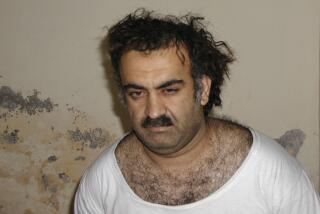Death Penalty Sought for Kaczynski
- Share via
WASHINGTON — Federal prosecutors have recommended that the government seek the death penalty against Unabomber defendant Theodore J. Kaczynski despite the anguished pleas of family members who turned him in, according to a Justice Department source.
Atty. Gen. Janet Reno is expected to make a final decision very shortly, perhaps this week, the source said.
For months, a high-level Justice Department committee, which Reno set up in 1995 to review federal death penalty decisions, has been weighing whether to seek the ultimate sanction against Kaczynski. The 54-year-old mathematician is accused of carrying out a 17-year series of bombings that targeted those involved with advanced technology and killed three people and injured 23 others.
As part of their review, prosecutors have been interviewing victims and their families--many of whom have called for the death penalty, officials said. They also have heard from members of Kaczynski’s family and their attorney, Anthony P. Bisceglie, who have pleaded for mercy.
Although the family of a defendant ordinarily would not receive great consideration in such a case, the Kaczynski family is in a different position, officials have said.
Federal agents had hunted fruitlessly for the Unabomb suspect for years until David Kaczynski turned his brother in. His suspicions had been aroused after reading the 35,000-word manifesto that the Unabomber succeeded in having the New York Times and Washington Post publish in 1995. The manifesto seemed similar to his brother’s writings, David Kaczynski told authorities.
Officials have conceded that without the family’s assistance, they might never have found Theodore Kaczynski.
Since Kaczynski’s arrest, his family has campaigned openly for his life to be spared. In a televised interview on CBS’ “60 Minutes” last fall, Wanda Kaczynski, the suspect’s mother, raised the possibility that her son is deranged.
“There are people in this world that are mentally ill. Are we going to start killing them?” she asked. “What kind of a barbaric society are we headed for?”
David Kaczynski has publicly said that if the government does seek to execute his brother, the move would discourage members of other families in future cases from coming forward with their suspicions as he did. Some law enforcement officials have privately conceded that the potential chilling effect on other families concerns them.
But officials said that the chief prosecutor in the case, Robert J. Cleary, has sided with the relatives of many victims who have told prosecutors that if Theodore Kaczynski is convicted as the Unabomber, he should be executed.
“I believe he killed my son, and he ought to pay for it,” Bessie Dudley, the mother of one of the Unabomb victims, said in an interview with The Times last year. Dudley’s son, Hugh Scrutton, a Sacramento computer store owner, died in a 1985 bomb attack.
The more than 6,000 pages of diaries and other writings that federal agents seized from Kaczynski’s remote cabin in Montana depict a clearly calculated series of attacks that were meticulously planned and intended to kill, prosecutors believe.
Reno has refused to discuss publicly the decision she faces in the case, but her own views of the death penalty could add a further wrinkle to the decision making.
When she was nominated to be attorney general in 1993, Reno reaffirmed earlier statements that she personally opposed the death penalty but said she would be willing to administer it in appropriate cases. Since then, she has approved a death penalty recommendation in the case of Timothy McVeigh, who is on trial for the bombing of the Oklahoma City federal building.
Legal scholars have said that a government decision on whether to seek the death penalty would affect every stage of the proceedings from now through Kaczynski’s trial, which is scheduled for late this fall in Sacramento.
If Reno rejects the death penalty recommendation, defense lawyers will be free to concentrate exclusively on pursuing the strategy that has become apparent by the pretrial motions they have already filed in the case. Under that strategy, they would argue largely that federal investigators rushed to arrest Kaczynski and ignored possible leads that pointed at different suspects.
But if the government does pursue the death penalty, defense lawyers probably will concentrate much more heavily on presenting psychological and other evidence that might persuade a jury to return a verdict of life in prison, experts say.
Times staff writer David Lauter in Los Angeles contributed to this story.
More to Read
Sign up for Essential California
The most important California stories and recommendations in your inbox every morning.
You may occasionally receive promotional content from the Los Angeles Times.










